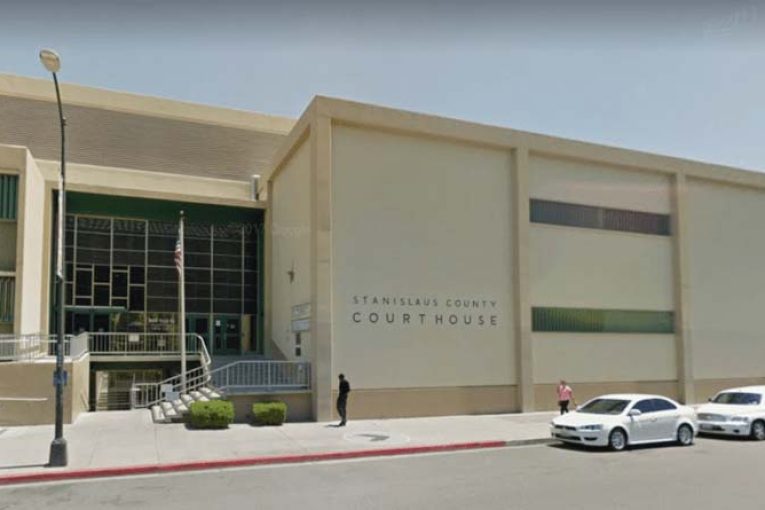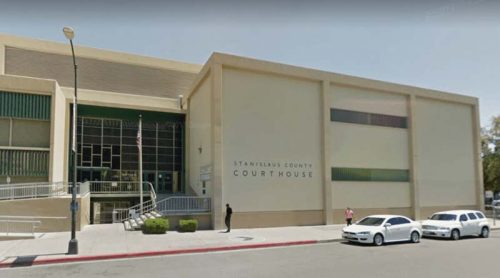

By Brinda Kalita, Citalli Florez, and Michael Apfel
MODESTO, CA- A motion to suppress illegally obtained evidence was filed Monday in Stanislaus County Superior Court by attorney Scott D. Levy on the behalf of a man accused of driving under the influence. (The Vanguard won’t name the accused if charges are not felonies).
The court denied the motion, and determined the accused should stand trial Oct. 19 after the hearing.
California Highway Patrol Officer Mathew Pender was the first witness brought to the stand in the trial and testified he drew the conclusion the accused was the driver of the vehicle based on observations he had made. He believed the man was the only person there, the man had the vehicle registered under his name and the accused was in possession of the keys.
The officer also testified that he believed the defendant was the driver because he had called 911 to report the crash. Later in the hearing, it was revealed it was actually an electronic emergency device connected to the vehicle.
Officer Pender stated he only knew the accused was there at the time of the crash and did not know the context of the 911 call.
According to Officer Pender, on the day of the collision, he spoke to the accused after he was transported to Memorial Medical Center to receive care from medical personnel. The accused had explained to the officer that he did not remember being part of the crash.

During the hearing, it was revealed Officer Pender also believed that he smelled the odor of an alcoholic beverage on the accused’s breath, and believed the man was under the influence. Officer Pender testified the man had told him he had consumed alcohol earlier in the evening.
However, on the day of the collision, there were issues regarding the completion of a sobriety test. According to Officer Pender, the accused refused to open his eyes to complete a field sobriety test. He was then notified of implied consent and asked to complete a breathalyzer test or blood test.
Officer Pender, however, also arrested the man before notifying him of having to complete a chemical test. The accused chose to do a breathalyzer test but was unable to complete the test because he was unable to produce enough volume for a sample.
After not being able to produce a sample, Officer Pender told the man he would be required to complete a blood test, but the man refused and the officer contacted a judge for a blood draw warrant. The warrant was issued and the accused was forced to give a blood sample.
Officer Pender admitted he did not offer the option of a sobriety test through a urine sample. According to the officer, the option is only offered to those who are affected by hemophilia or who have a phobia of needles. The accused was never asked if he was affected by either.
The second witness called to the stand was a nurse, who took the accused’s blood samples when he arrived at the hospital after getting into the crash.
In her testimony, the nurse said she did not feel anything was out of the ordinary when she was drawing the man’s blood, adding he never mentioned that he was in pain.
However, the nurse also stated that she did not remember much about the day itself and that she does not remember what the accused was wearing nor his appearance the day of the incident.
The third witness called was the accused, who testified to the details of his blood draw. While he had an interpreter helping him testify in court, he had no interpreter on the night in question.
The accused explained the nurse was wearing gloves but no face mask, applied a liquid onto his arm before drawing blood, and that he felt a burning sensation when the needle was in his arm. He reported telling the nurse about the pain.
Prior to putting the liquid on the accused’s arm or drawing his blood, he stated that she did not ask if he had any allergies or diseases like hemophilia, and noted it was his first time ever having his blood drawn in the U.S. and that the nurse never asked if he was afraid of needles.
The accused testified he was concerned about disease and infection while his blood was being drawn. He further stated he was at the hospital because of shoulder pain and remembered the accident he was in that day, but he denied ever telling the officer he had been drinking alcohol.
The accused testified that he did not consume alcohol on the day in question.
A jury trial will be conducted in his case on Oct. 19.
